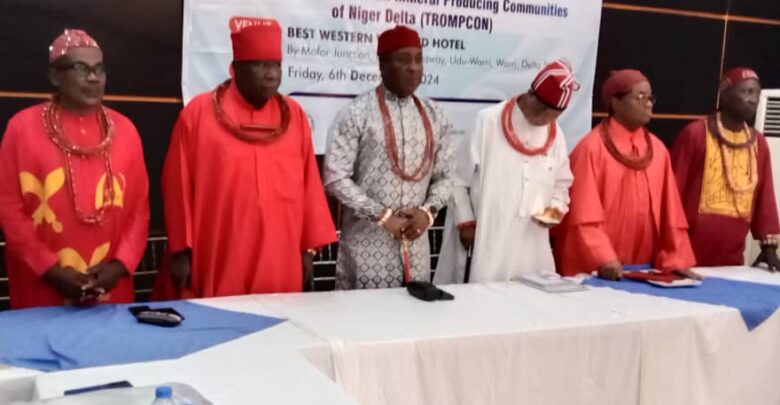News
Traditional Rulers Identified Lack of Constitutional Roles As Fueling Crisis In Niger Delta

Ogheneruona Tejiri, Warri
Lack of Constitutional roles for traditional rulers in the 1999 Constitution of the Federal Republic of Nigeria as amended has been identified as a major set back in the effective governance as well as recurring crisis between multi national companies, government intervention agencies and the communities.
This was the position of the Traditional Rulers of Oil Mineral Producing Communities, (TROMPCON) Delta State chapter at a one Day Capacity Building Programme for the Delta Stat Executive of Traditional Rulers of Oil Mineral Producing Communities (TROMPCON)by Niger Delta Development Commission (NDDC)in Warri, Delta State, they blamed their ineffective contributions to Niger Delta governance on lack of constitutional roles for traditional rulers.
Speaking to journalists at the end of the workshop, HRM Anthony Ogbogbo Ibuka 1, Ovie of Ozoro Kingdom in Isoko North Local Government Area, Chairman of TROMPCON, Delta State, commended NDDC for its initiative in organising the capacity building workshop with a theme, “Capacity Building On Emerging Trends In Rural Governance” for the monarchs.
According to HRM Ogbogbo Ibuka 1, “this programme will ginger us up on what we are supposed to do and also advise us on how we are supposed to go about them. “
He said that the programme gave them, the traditional rulers the opportunities to brainstorm on contemporary issues inhibiting development in the Niger Delta region, adding , “we, the monarchs were able to identify and highlight notable challenges of the Petroleum Industry Act (PIA) as it affects the host communities”.
The Delta State TROMPCON chairman pointed out, ” TROMPCON, Delta State chapter also used the workshop to make some suggestions and recommendations to the organizers, the NDDC for possible collation and presentation to the appropriate authorities”.
Identifying some challenges confronting TROMPCON, HRM Ogbogbo, Ibuka 1 said, “the absence of constitutional roles for traditional rulers and power to back up responsibility subjects us to the whims and caprices of the ruling government. We, the traditional rulers are ready to work but we are frustrated and hampered by lack of Constitutional provisions.”
He further, added, “government should recognize the roles of traditional rulers and ensure operational guidelines to that effect to enable them contribute their quota more for effective governance.”
“In this regard, advocacy to integrate traditional rulers should be sustained and vigorously pursued. Lack of
Constitutional roles for traditional rulers has been hampering our contributions. It brings us downward.
“If there is need to checkmate identified excesses from some quarters, individuals will challenge you; they will oppose you; they will frustrate you because you don’t have something to point out to back you as monarch, to say I am working within the ambit of law”.
In a keynote address, Mr. Stanley Okereke, NDDC Workshop Facilitator, a Climatologist and Peace Advocate called on all stakeholders, especially the government, oil and gas companies and others to work together in synergy to avoid retrogressive development.
Mr. Okereke emphasized the need for traditional rulers to utilize their indigenous knowledge as local content into peace initiatives in the Niger Delta region, saying that they (Traditional Rulers) have key roles to play in the narratives towards attaining and sustaining peaceful co-existence.
Mr. Okereke added, “if the traditional rulers are playing their roles effectively and efficiently, then the issue of violent conflicts will actually be a thing of the past. The way of managing conflict or preventing conflict will help in ensuring sustainable development in the Niger Delta region as any development without sustainability is a waste of resources.
“Consequently, we need to develop a framework that will ensure that the traditional rulers are integrated into the system for managing peace and conflict in the region with a view to putting in place sustainable peace in the entire Niger Delta region.”

